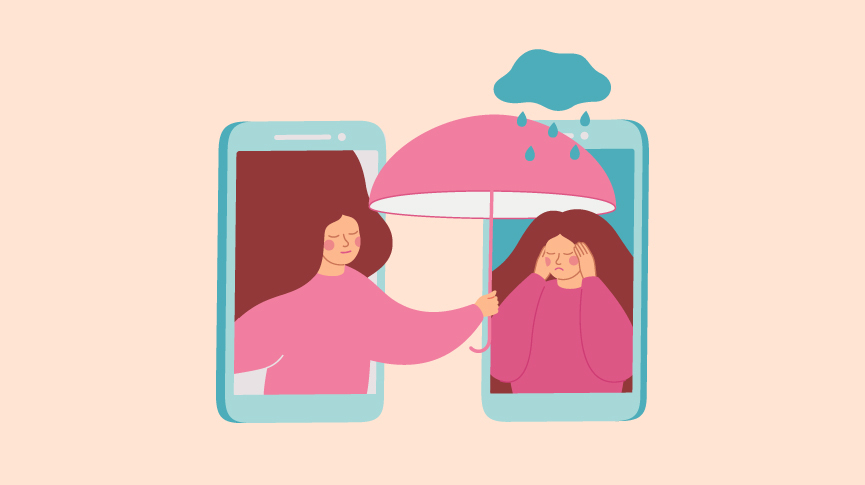Concussions and Mental Health in Females

This article was medically fact-checked by Consultant Obstetrician and Gynaecologist Dr. Shree Datta.
Whether you’re an athlete, have gotten into an accident, or have had some other unfortunate bonk to the brain – there’s nothing quite like the discomfort of a concussion.
Oftentimes these injuries go undocumented, or are brushed off, as they are less tangible than many other injuries. Unfortunately concussions can come with long term symptoms, that can affect people for years to come.
One of the biggest ways concussions impact people long term is through their mental health.
We’re here to look at the ways concussions affect the mental health of cis-women, and people assigned female at birth (AFAB).
What Exactly Is A Concussion?
First things first, let’s break down the basics of what a concussion is exactly.
When the head is bumped, jolted, or hit, it can cause the brain to bounce around inside the skull, leading to a mild traumatic brain injury, TBI, aka a concussion. The consequent chemical changes can potentially damage and stretch brain cells.
This can lead to a temporary loss of consciousness, or a feeling of being dazed, confused, or stunned. While we tend to hear about concussions in the context of athletes, they can potentially happen to someone of any age, at any time.
Common Concussion Symptoms
It’s not always immediately obvious when someone gets a concussion, and symptoms may be slow to develop, or change over time.
Symptoms can vary across individuals, but here are some telltale signs of a concussion.
- Confusion: Especially around the event, or a sort of everyday haziness.
- Lack of Coordination: Change in coordination and agility.
- Fatigue: It may be difficult to complete everyday tasks, as you easily become fatigued.
- Loss of Consciousness: Even if it’s for only a brief period of time.
- Headache: These may resemble a migraine, or feel more like a tension headache, starting from the neck.
- Nausea: Which may be accompanied by a change in appetite.
- Light and Noise Sensitivity: This is one of the most common symptoms, and leads people to stay in bed without the lights off when healing from a concussion.
- Emotional Disturbances: A change in mood or personality, which can resemble anxiety and/or depression.
Healing From A Concussion
Immediate concussion care outside of seeking medical help, is mainly to rest.
As difficult as it can be for many people’s lifestyles, returning to regular activities too soon after a TBI can hinder your body’s ability to heal.
It’s also advised to avoid alcohol and caffeine. Your doctor may recommend certain supplements to help aid you in healing your brain.
Concussion Effects Between The Sexes
The biological male and female brain does differ in its structure, processing, blood flow, brain activity, and chemistry. Gender identity aside, it reasons to stand that concussions can affect the biological sexes differently.
One of the main areas researchers have been able to study these differences is in sports where males and females have the same rules – like soccer. Based on these studies, females are almost twice as likely to have a concussion versus their male counterparts. They also experience longer recovery periods after a concussion, along with more severe symptoms.
For females in the military who experience a TBI, they are more likely to experience Post Traumatic Stress Disorder, and other mental health issues.
Concussions And Mental Health
People who have experienced a concussion may find themselves having increased depression, anxiety, irritability, difficulty concentrating, and anger – without making the direct correlation that it stemmed from a concussion.
Sleep disturbances are a common symptom amongst both sexes, and can contribute to depression and anxiety, as well as complications with cognition. Even with normal sleep patterns, many people will still experience mental and emotional changes after a concussion.
It’s difficult to gather definitive evidence of the long term effects of concussions, because most of these symptoms are self reported, especially when they are in regards to the effects they have on daily activities.
There are no specific biomarkers, or ways to specifically test for a concussion, outside of examining symptoms and the incident itself. In some cases, a CT scan may be done, but this is not common, and may not necessarily help in the healing process.
Again, while these symptoms are self-reported, females do have higher rates of depression and stress following a concussion. This may be due to the biological differences between male and female brains, although the jury is still out on this one.
Knowing these long term effects for females, can help providers and researchers focus how to develop more specific and effective healing protocols, with biological differences in mind.
Healing from a concussion can be incredibly frustrating. Months of just not feeling like yourself, or being able to do as much as you’re normally able to can be incredibly trying. As difficult as it can be to do, one of the most important things you can do is give yourself patience and time.
For more in-depth support, there are TBI specialists, who can give you proper healing tools, as well as mental health providers that can aid you in your healing journey.
Facts Checked By:

Dr. Shree Datta is a Consultant Obstetrician and Gynaecologist in London, specialising in women’s health including all menstrual problems such as fibroids and endometriosis. Dr. Shree is a keen advocate for patient choice, having written numerous articles and books to promote patient and clinician information. Her vision resonates with INTIMINA, with the common goals of demystifying periods and delivering the best possible care to her patients.
Article written by:

Natasha (she/her) is a full-spectrum doula and health+wellness copywriter. Her work focuses on deconstructing the shame, stigma, and barriers people carry around birth, sex, health, and beyond, to help people navigate through their lives with more education and empowerment. You can connect with Natasha on IG @natasha.s.weiss.


